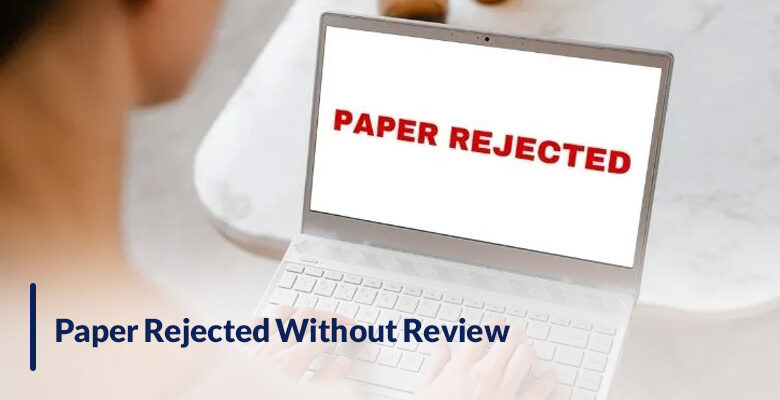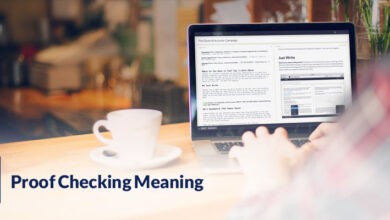Paper Rejected Without Review

After the thrill of research and the careful manuscript submission process, the judgment arrives acceptance or rejection. Rejections, particularly those without formal peer review, can be disheartening.
There are some times when the authors’ paper is rejected without review. This article delves into this specific scenario, exploring the reasons behind leaving without review, known as desk rejection, and offering actionable steps to help you solve this issue. If you have been in such circumstances and didn’t know how to react, here is the empowering formulation.
Why Papers Get Rejected Without Review?
While disappointment upon receiving a paper rejection is understandable, being calm to make correct decisions is vital.
Here, you can find the most common reasons for desk rejections and better understand the editor’s decision; consequently, it caters to making the right decision.

Here are the most common reasons for desk-rejecting; take a look at them:
1. Scope Mismatch
What is the scope mismatch? It simply refers to the situation where the article’s content is not within the journal’s scope.
In other words, if your article is outside the targeted journal’s intended audience or area of expertise, it’s considered a “scope mismatch.”
We bring this up in the first part and as the first reason because this issue is the most common reason for papers to be rejected without formal peer review.
An Example of Scope Mismatch: If you submit a paper on animal behavior to a journal specializing in astrophysics, it is considered a scope mismatch.
A note to be remembered: A desk rejection due to scope mismatch doesn’t reflect the quality of your research.
If you understand the specific interests of different journals and search more, you can find a journal matching your article and significantly increase your chances of successful publication.
2. Novelty & Impact
It happens when your paper offers no new information based on the journal’s published article.
When your paper gets rejected without formal review, the other common culprit is the perceived lack of novelty and impact. Simply put, your research must offer something new to the academic world, different from what’s already known.
What do we mean by “something new?” it can be:
- New findings
- New methods
- New interpretations
- Broader implications
- Future directions
- Relevance to the field
If you want some tips so you can showcase Novelty & Impact, remember the tips below:
- Make your research questions clear and demonstrate them well.
- Focus on the newness of your findings, methods, or interpretations.
- Discuss the broader implications and potential applications of your work.
And finally, remember that if you highlight both novelty and impact, you can secure a full review.
3. Not Presenting Sufficiently
Maybe your study is incomplete, and you couldn’t conduct it comprehensively enough. This is one of the reasons that your paper might be rejected without review since it is simply narrow. But remember that it is not about the number of pages but the knowledge.
Just ask yourself these questions:
- Does your study explore a similar breadth of parameters?
- Have you incorporated complementary methods or addressed the next logical step, such as real-world validation or upscaling your process?
You can expect a great review result if you confidently believe your data supports your paper’s conclusions.
4. Using Outdated Methods
If your paper relies on outdated methods, it will have a high-risk desk rejection. The dated methods might lack relevance and limit the research’s potential.
Suppose you begin analyzing existing techniques, explaining your decisions, investigating alternatives, and getting expert guidance. In that case, you may guarantee that your study employs proper tools and avoids this typical rejection without reviewing the reason.
5. Errors in Author Information
Pay attention to the details of your paper to avoid any unlikely typos and information errors. This does not have a good effect on your paper and might cause your paper to be rejected without review.
What can you do to avoid rejection only for the author’s information errors? Look at the tips below:
- Double-check all author information, including Names, affiliations, email addresses, contribution statements, etc.
- Follow the journal’s specific formatting guidelines in referring to their author’s instructions for exact requirements.
You can also freely communicate with co-authors and ask for their opinions and guidance.
6. Rights & Permissions
This is one of the less common reasons for your paper desk rejection. Still, copyright and permission issues can cause your paper to be rejected without review.
Consider that if an author uses any data without permission, it will raise legal concerns for the journal. To avoid this incident, acquire permissions accurately, respect ethical guidelines, and follow open access requirements to prevent unnecessary dismissals.
Read More: How To Write % Symbol in Latex Overleaf?
Conclusion
Here, you can find the most common reasons that you might be desk rejected, or in other words, your paper rejected without review.

You can ensure a clear and consistent paper by avoiding these common errors. Do you have any experience with desk rejection? How did you make that up? Please share your experience.



